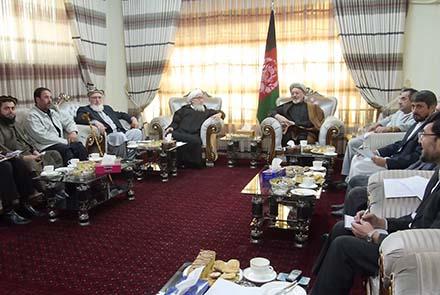President Ashraf Ghani on Monday night announced the appointment of Mohammad Karim Khalili, a former vice president, to lead the High Peace Council (HPC).
The announcement was made on the eve of the Kabul Process meeting, which was held in the capital on Tuesday.
Ghani said that he hopes Khalili takes the political aspects of the peace process into consideration and responds positively to the demands of women and civil society institutions in the process.
Meanwhile, a number of politicians have termed Khalili’s appointment as new HPC chief a hasty decision ahead of the Kabul Process meeting.
“I am happy that Mr. Khalili is here to present the political and security aspects of the peace from the address of the High Peace Council and consider the demands and experience of the women and civil society institutions in the peace process,” said Ghani.
Khalili who has been the deputy head of the HPC leads the Hizb-e-Wahdat-e-Islami Afghanistan party.
Some HPC members have welcomed Khalili’s appointment and say they hope he will open the doors for peace negotiations with the Taliban.
“The policy has been in place that someone from the Jihadi figures move the peace process forward, now Mr. Khalili has taken the initiative, he has got experience in Jihad and we hope that he will be successful in his job,” said HPC member Sayed Amin Weqad.
But politicians say that the HPC is no longer effective in terms of promoting peace talks, saying Ghani wants to keep politicians busy with such tasks.
“So far the High Peace Council has failed to meet the expectations of the people of Afghanistan, everyday our youths are killed,” said political analyst Sayed Eshaq Gailani.
The High Peace Council was initially established by former president Hamid Karzai in 2010.
On Tuesday, Ghani officially opened the Kabul Process meeting and said Afghanistan was on the frontline of terrorism in the world.
Delegates representing 23 nations and the European Union, the United Nations and NATO are attending the summit.

